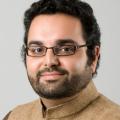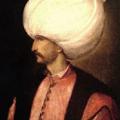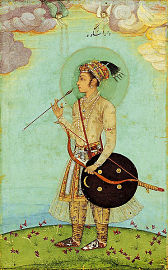189 - Subcontinental Drift: Philosophy in Islamic India
Ideas spread to Mughal India from Iran, and prince Dārā Shikūh seeks to unite the wisdom of the Upanishads with the Koran.
Themes:
• A.Q. Ahmed, “Post-Classical Philosophical Commentaries/Glosses: Innovation in the Margins,” Oriens 41 (2013), 317-48.
• M. Mahfuz-ul-Haq (trans.), Majmaʿ-ul-Baḥrain or The Mingling of the Two Oceans by Prince Muḥammad Dārā Shikūh (Calcutta: 1929).
• I.A. Omar, “Delhi’s Debates on Ahl-i Kitāb: Dara Shikuh’s Islamization of the Upanishads,” in R.C. Taylor and I.A. Omar (eds), The Judeo-Christian-Islamic Heritage: Philosophical and Theological Perspectives (Marquette: 2012), 89-109.
• S. Rizvi, “Mīr Dāmād in India: Islamic Philosophical Traditions and the Problem of Creation,” Journal of the American Oriental Society 131 (2011), 9-23.
• F. Robinson, The ʿUlama of the Farangi Mahall and Islamic Culture (New Delhi: 2001).
My thanks to Asad Ahmed and Jan-Peter Hartung for advice on this episode!







Comments
Ganeri on Dara Shikuh
Since we will have the benefit of Jonardon Ganeri on Indian philosophy generally soon enough, I thought I'd point out that he has written on one of the subjects discussed in this week's podcast: https://www.academia.edu/2146286/Dara_Shikoh_and_the_Transmission_of_th…
al-Bihari's mental representation vs things-in-themselves
You allude that al-Bihari's distinction between mental representation vs things-in-themselves mirrored later issues in European philosophy. Are you referring to the issues related to, for example, Kant's distinction between phenomenon and noumenon? In what way do they mirror each other?
In reply to al-Bihari's mental representation vs things-in-themselves by Hoom
Mental vs things
Well, Kant is certainly relevant but I meant, somewhat more broadly, the whole debate he was responding to like in early empiricism. It's been claimed that the skeptical issues about whether our mental representations actually capture external reality are distinctive of modern European thought, and were not yet present in ancient philosophy. So I wanted to highlight that it does turn up here in later Islamic thought, more or less independently though I think the fact that Avicenna influenced both traditions is relevant.
Please sir, more.
It feels like there could be a lot more said on philosophy in Islamic India, North Indian colleges (Madrasah) were particularly reknown for philosophy, logic and jurisprudence. Carl Ernst has done some fascinating work on Muslim studies of Hindu philosophy, the Sanskrit translation movement, not to mention the various engagements with other philosophical cultures, of which Dara Shikoh is probably the most famous example, but also engagement with the west. It was in India that Persian translations of Descartes were commissioned in the 17th century by Danishmand Khan, in the 1780s Tazzaful Hussein Khan produced numerous translations including of Newton's Principia, Emerson's Mechanics and Simpson's Algebra. Sadly, they remain a critically understudied area of Islamicate intellectual history for a variety of reasons. Chief among them attitudes of modernists in India that rendered Persian a foreign language or a 'Muslim language' (whatever that is) and equally unforgiving Iranian nationalists who considered all so called 'sabk-i-hindi' an inferior perversion of the national mother tongue, all of which led to the understudy of Persian texts produced in South Asia.
An interesting development over the 19th century is how the Dars-i-Nizami, while still widley taught and relatively well regarded, has been radically abridged and altered. In particular, philosophy has been increasingly cut from the curriculum. Maybe decline did take place in the Islamic world, not in the 12th or 13th century, but in the gradual death of the traditional scholarly community brought on by waning patronage, manuscript theft, shrinking endowments and the rise of STEM and business centric education throughout the third world since the 50s.
In reply to Please sir, more. by A.
More
Yes, there would be a huge amount more to say - in fact quite generally I really did a pretty brief overview of developments in the 19th-20th c Islamic world, feeling that it was just too huge and too difficult a topic to take on in detail. Possibly we will get another chance to do the Indian intellectual developments you describe here, if we do a further series on later philosophy in India someday (the current series will stop at the end of the classical period).
DIY dars
Which philosophical texts were prescribed in Sahalavi's original dars i nezami curriculum? I know Porphyry's Isagogue, Wali Allah's al-Baligha and Al-Abhari's Hidaya continue to be studied and some places still teach Sadra and even Avicennan medicine. It's clear that Indian madrasahs have splintered along sectarian lines with each chopping bits off the curriculum to meet their ideological needs. A famous example is Deoband's fatwa banning the teaching of Hafiz's poems after British colonials took issue with the book's apparent homoeroticism. I'm asking this because I take Classics along with Arabic and I'm planning on going through the Nizami myself at some point. I want to make other classical traditions the focus of my dissertation.
In reply to DIY dars by Ebani
Dars curriculum
I don't have a complete list handy, but you could consult the work of Asad Ahmed and Jan-Peter Hartung on this (or get in touch with them, I am sure they would be happy to give you more info given your serious interest in this!).
Dārā Śikūh in India timeline too
Can this Dārā Śikūh episode be linked to in the India timeline too? Yes, it's not covered in the India series but in the Islamic World one. Still, Dārā Śikūh lived in modern-day India, and you can link to this episode even when covering post-classical Indian philosophy sometime in the future! This is much like how Muhammad Iqbal too was covered in the Islamic World rather than India series.
In reply to Dārā Śikūh in India timeline too by Tarun G
Dara Shikoh
Oh good idea, I'll do that!
Add new comment